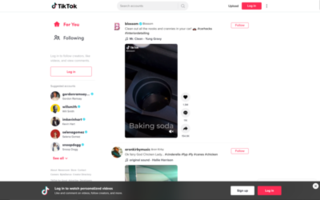E-commerce is the activity of electronically buying or selling products on online services or over the Internet. E-commerce draws on technologies such as mobile commerce, electronic funds transfer, supply chain management, Internet marketing, online transaction processing, electronic data interchange (EDI), inventory management systems, and automated data collection systems. E-commerce is the largest sector of the electronics industry and is in turn driven by the technological advances of the semiconductor industry.

Opera Limited is a multinational technology conglomerate holding company headquartered in Oslo, Norway with additional offices in Europe, China, and Africa. Opera offers a range of products and services that include a variety of PC and mobile web browsers, GameMaker and gaming portals, the Opera News content recommendation products, the Opera Ads platform, and a number of Web3 and e-commerce products and services. The company's total user base is 311 million monthly active users.

Baidu, Inc. is a Chinese multinational technology company specializing in Internet-related services, headquartered in Beijing's Haidian District. It holds a dominant position in China's search engine market, and provides a wide variety of other internet services such as Baidu Baike, iQIYI, and Baidu Tieba.

Alibaba Group Holding Limited, branded as Alibaba, is a Chinese multinational technology company specializing in e-commerce, retail, Internet, and technology. Founded on 28 June 1999 in Hangzhou, Zhejiang, the company provides consumer-to-consumer (C2C), business-to-consumer (B2C), and business-to-business (B2B) sales services via Chinese and global marketplaces, as well as local consumer, digital media and entertainment, logistics and cloud computing services. It owns and operates a diverse portfolio of companies around the world in numerous business sectors.

Taobao is a Chinese online shopping platform. It is headquartered in Hangzhou and is owned by Alibaba. According to Alexa rank, it was the eighth most-visited website globally in 2021. Taobao.com was registered on April 21, 2003 by Alibaba Cloud Computing (Beijing) Co., Ltd.

Tencent Holdings Ltd. is a Chinese multinational technology conglomerate and holding company headquartered in Shenzhen. It is one of the highest grossing multimedia companies in the world based on revenue. It is also the world's largest company in the video game industry based on its equity investments.
Shopify Inc., stylized as shopify, is a Canadian multinational e-commerce company headquartered in Ottawa, Ontario. Shopify is the name of its proprietary e-commerce platform for online stores and retail point-of-sale systems. The Shopify platform offers online retailers a suite of services, including payments, marketing, shipping and customer engagement tools.
InMobi is an Indian multinational technology company, based in Bangalore. Its mobile-first platform allows brands, developers and publishers to engage consumers through contextual mobile advertising. The company was founded in 2007 under the name mKhoj by Naveen Tewari, Mohit Saxena, Amit Gupta and Abhay Singhal.

Pinterest is an American image sharing and social media service designed to enable saving and discovery of information like recipes, home, style, motivation, and inspiration on the internet using images and, on a smaller scale, animated GIFs and videos, in the form of pinboards. Created by Ben Silbermann, Paul Sciarra, and Evan Sharp, Pinterest, Inc. is headquartered in San Francisco.

Stripe, Inc. is an Irish-American multinational financial services and software as a service (SaaS) company dual-headquartered in South San Francisco, California, United States and Dublin, Ireland. The company primarily offers payment-processing software and application programming interfaces for e-commerce websites and mobile applications.

AliExpress is an online retail service based in China and owned by the Alibaba Group. Launched in 2010, it is made up of small businesses in China and other locations, such as Singapore, that offer products to international online buyers. It is the most visited e-commerce website in Russia and was the 10th most popular website in Brazil. It facilitates small businesses to sell to customers all over the world. AliExpress has drawn comparison to eBay, as sellers are independent and use the platform to offer products to buyers.

ByteDance Ltd. is a Chinese internet technology company headquartered in Haidian, Beijing and incorporated in the Cayman Islands.

Wish is an American online e-commerce platform for transactions between sellers and buyers. Wish was founded in 2010 by Piotr Szulczewski and Danny Zhang.

Xiaohongshu, also known as RED, is a social media and e-commerce platform. It has been described as "China's answer to Instagram", and is sometimes referred to as "Chinese Instagram".

TikTok, whose mainland Chinese counterpart is Douyin, is a short-form video hosting service owned by Chinese internet company ByteDance. It hosts user-submitted videos, which can range in duration from three seconds to 60 minutes. It can be accessed with a smartphone app.

Pinduoduo Inc. is a Chinese online retailer with a focus on the traditional agriculture industry. The business is the largest product of PDD Holdings, which also owns the Ireland-based online marketplace Temu.
Colin Huang or Huang Zheng is a Chinese businessman, investor, and philanthropist. He is the founder and former CEO of the e-commerce company Pinduoduo, which is now the largest agriculture platform in China. Huang is also the owner of at least three other limited liability Cayman companies, including Pinduoduo.

Meta Platforms, Inc., doing business as Meta, and formerly named Facebook, Inc., and TheFacebook, Inc., is an American multinational technology conglomerate based in Menlo Park, California. The company owns and operates Facebook, Instagram, Threads, and WhatsApp, among other products and services. Meta ranks among the largest American information technology companies, alongside other Big Five corporations Alphabet (Google), Amazon, Apple, and Microsoft. The company was ranked #31 on the Forbes Global 2000 ranking in 2023. In 2022, Meta was the company with the third-highest expenditure on research and development worldwide, with R&D expenditure amounting to US$35.3 billion.

Huawei AppGallery is a package manager and application distribution platform, or marketplace 'app store', developed by Huawei Technologies Co., Ltd. It serves as the official app store for the devices running on Huawei HarmonyOS, and is also available for Huawei EMUI and Microsoft Windows via the Mobile Engine emulator.
Shein is a fast fashion retailer. Founded in Nanjing, China, in October 2008 as ZZKKO by entrepreneur Chris Xu, Shein grew to become the world's largest fashion retailer as of 2022. The company is currently headquartered in Singapore.















